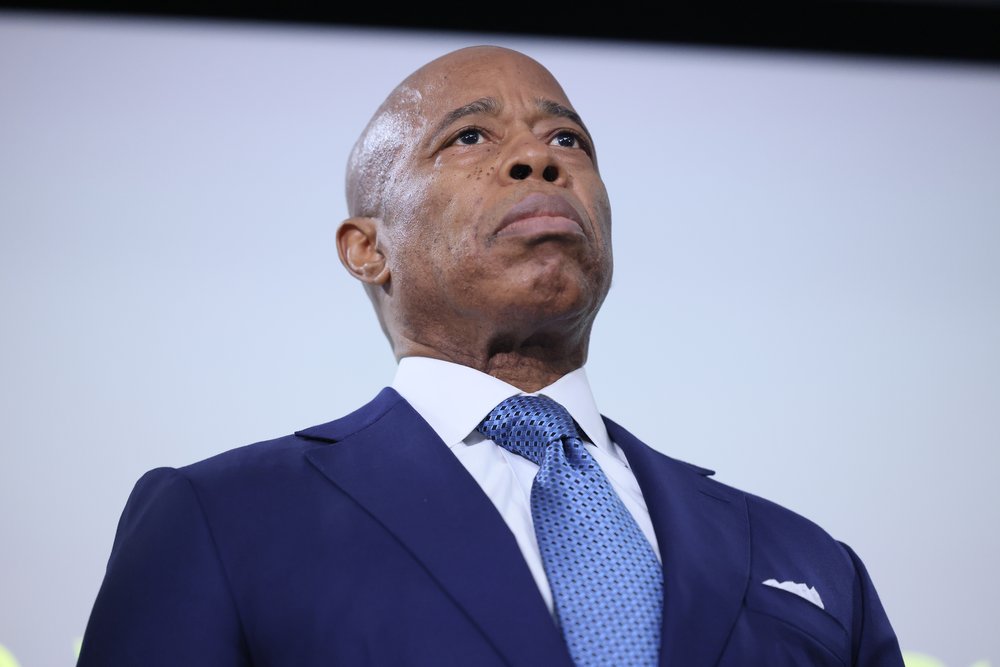NYC sues owners of TikTok, Instagram and other social media sites over youth mental health
Feb. 14, 2024, 4:48 p.m.
A new lawsuit alleges the companies are exposing children to harm through addictive algorithms and other features.

New York City is suing the companies that own TikTok, Instagram, Facebook, Snapchat and YouTube, alleging that the social media platforms are driving a spike in mental health issues among young people, Mayor Eric Adams said on Wednesday.
The lawsuit was filed in California Superior Court and aims to force the companies to change their practices as well as cover the costs of addressing what city officials have deemed a public health threat. Adams’ office said the city currently spends more than $100 million a year on youth mental health programs, though the suit doesn’t specify how much the administration is seeking in damages.
“Instead of learning confidence and resilience, they are being exposed to content that often leads to insecurity and depression,” Adams said at a press conference. “The features that keep young people clicking in these dark corners of social media have fueled an alarming rise in online bullying, depression, eating disorders and suicidal ideation.”
The percentage of New York City students who reported feeling sadness and hopelessness or having thoughts of self-harm increased between 2011 and 2021, with non-White, female and LGBTQ students more likely to be affected, according to a report released by the city’s health department in November. Nearly 40% of high school students reported feeling so sad or hopeless in the past year that they stopped engaging in their usual activities, the report found.
The lawsuit links these figures and social media use, noting that over three-quarters of the city’s high school students said in 2021 that they spent at least three hours a day on average “in front of screens — not including [time] spent on schoolwork.”
“Borrowing heavily from the behavioral and neurobiological techniques used in slot machines and exploited by the cigarette industry, defendants deliberately embedded in their platforms an array of design features aimed at maximizing youth engagement to drive advertising revenue,” the complaint reads. “Instead of feeding coins into slot machines, kids are feeding defendants’ platforms with an endless supply of attention, time and data.”
Google, which owns YouTube, did not immediately respond to requests for comment.
A spokesperson for TikTok, which is owned by Chinese company ByteDance, said in a statement that the platform has safeguards to support teenagers’ well-being, citing its age-restricted features and parental controls.
“We regularly partner with experts to understand emerging best practices, and will continue to work to keep our community safe by tackling industry-wide challenges,” he said.
A spokesperson for Meta, which owns Instagram and Facebook, said the company offers multiple tools and features so that teens can have “safe, age-appropriate experiences online.”
“We’ve spent a decade working on these issues and hiring people who have dedicated their careers to keeping young people safe and supported online,” the spokesperson said.
A spokesperson for Snap, which owns Snapchat, said the app was "intentionally designed to be different from traditional social media."
"Snapchat opens directly to a camera – rather than a feed of content that encourages passive scrolling – and has no traditional public likes or comments," the spokesperson said. "While we will always have more work to do, we feel good about the role Snapchat plays in helping close friends feel connected, happy and prepared as they face the many challenges of adolescence."
Adams also referenced last month's State of the City address on Wednesday, in which he spoke about the city’s plans to create “the biggest student mental health program in the country,” including telehealth care, community-based counseling and daily breathing exercises for high schoolers. During that speech, Adams announced the city health commissioner was designating social media as a “public health crisis hazard” over its “addictive and dangerous features,” such as algorithms and game-like designs meant to keep users on the platforms.
“We know these platforms are designed with addictive and dangerous features that take advantage of a child’s natural interest in novelty and play,” the mayor said at the time. “The social on these platforms — the likes, the trophies, the streaks — are designed to manipulate a dopamine release in the brain.”
The New York City Department of Education is a plaintiff in the lawsuit and joins hundreds of other school districts across the country that are also suing social media platforms over children’s mental health challenges. Following the mass litigation, TikTok changed its U.S. terms of service and now requires legal complaints be filed in one of two California courts.
Last month, New York Gov. Kathy Hochul also announced her intent to try to limit harms from social media on children’s mental health. Her comments were part of a larger push by state officials — including Attorney General Letitia James — to regulate minors’ interactions with social media and tech companies’ data collection practices.
This story has been updated with comment from Snap.
Mayor Adams says social media is a ‘public health crisis hazard’ — what does that mean for NYC? NY Gov. Hochul aims to take on mental health access, ‘addictive’ social media NY government gears up for fight against TikTok, Facebook and other social media giants